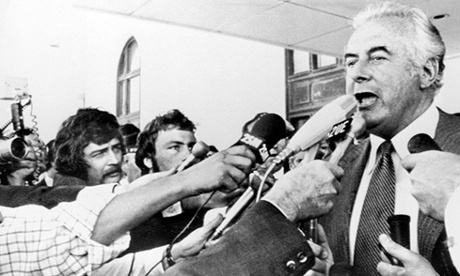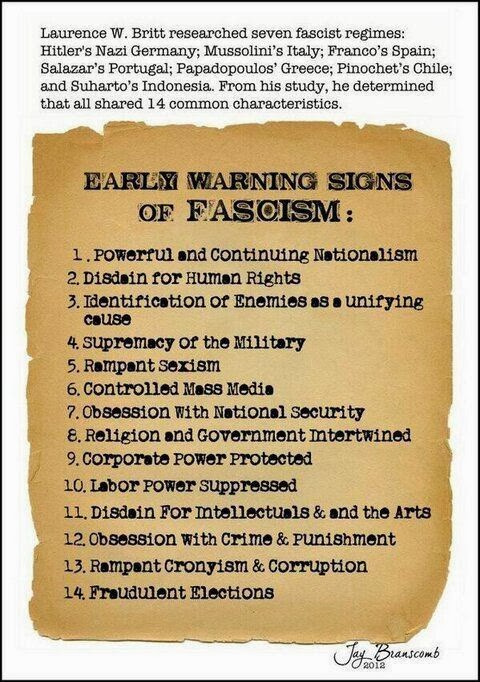Whitlam's memory was demonised by conservatives to excuse his dismissal
The constitutional crisis of 1975 is a reminder of the lengths to which politicians on the right will go in the pursuit of power

Gough Whitlam
addresses reporters outside parliament in Canberra after his dismissal
by the governor general during the constitutional crisis of 1975.
Photograph: Keystone/Hulton Archive
A few great events in the history of this country are known simply
by their year: 1788 means European settlement, 1915 means Gallipoli. And
1975 is the name we give to the ruthless clawing down of Gough Whitlam.
Scarcely any constitutional lawyers left alive applaud Sir John Kerr
for what he did to the Labor prime minister on 11 November that year.
Not all the plotters are dead. From time to time fresh details emerge of
the outrages planned behind closed doors by Kerr and his circle. But
the verdict of both the law and history has been savage: there was no
justification for the sacking of Whitlam.
The many mistakes of his government were not for the governor general
to correct. The electorate would do that in good time. But the
opposition was impatient. A mighty panic was running in Australia. The
fate of the nation was said to be at stake. The newspapers of all the
proprietors were urging vice-regal intervention.
Whitlam’s weakness in the crisis was his deep attachment to
convention. He was not the radical here. Since blocking supply was last
threatened in the UK in the early years of the century, an upper house
cutting off the government’s cash was considered beyond the democratic
pale.
But not by the Liberal and Country parties in Australia. Whitlam went
to the polls when the opposition threatened supply in 1974 and stared
down Malcolm Fraser when he threatened again in 1975.
But the lawyer and historian in Whitlam never really believed the
opposition would carry out its threat. From the sidelines, an elderly
Bob Menzies urged the party he created to do the right thing and pass
supply. Liberal senators were on the brink of cracking. Then Kerr
struck.
November 11 was a day of no constitutional significance. Whitlam went
to Yarralumla with money to govern for at least another fortnight and
the undisputed support of the House of Representatives. That’s how we
make governments in this country: confidence and supply.
Whitlam wanted to call an election for half the Senate. There were
good prospects this would give him control of the upper house. Instead
of accepting his advice, which every convention dictated, Kerr sacked
him and installed Fraser to take the country to a double dissolution.
Whitlam returned to the Lodge shattered. He might have contested Kerr
in the high court. Instead he chose the traditional ground: parliament.
That afternoon Kerr refused to receive the Speaker bringing news to
Yarralumla that Whitlam had won vote after vote of confidence in the
house.
Whitlam believed his martyrdom would win him re-election. But not for
the last time, Australia showed itself to be a practical nation. The
country was bitterly divided over the sacking but keen to be rid of
Labor. Labor’s mistakes and the climate of fear did their work.
Whitlam never recovered. His political magic deserted him. Defeat in
1975 was followed by a second terrible defeat in 1977. He lived on for
decades, a great presence in Australia, a hero to his people and a prime
minister whose memory had to be demonised all the more extravagantly by
the right to excuse the manner of his downfall.
After the sacking, the constitution was cleaned up to make one key
breach of convention in 1975 impossible. The sacking happened only
because New South Wales and Queensland rorted the Senate by appointing
enemies of Whitlam to Labor vacancies. That can’t happen any more. But
little else has changed.
Malcolm Turnbull once remarked to me that 1975 was “a sui generis
fuck up”. Yet it still hangs like a question mark over politics in this
country, a reminder of Australia’s strange vulnerability to panic and
the lengths to which politicians who call themselves conservative will
go in the pursuit of power.
Kerr has his defenders still among the politicians of the Coalition.
Those who say 1975 is over and done with should pay attention to Tony
Abbott over the next few days as he puts in a good word for Kerr. Since
the prime minister’s university days, Kerr has been one of his
particular heroes. Abbott has an unshakeable belief that 1975 was right.
And vouching for Kerr will remind Australians that this ugly coup
isn’t behind us. One side of politics will still not disown what he did
and oppose any attempt to be rid of the ancient and contested powers of
the governor general which remain, in ruthless hands, ready to wreak
havoc on Australian democracy.


No comments:
Post a Comment